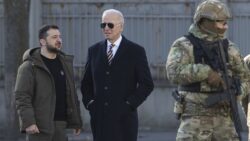Until this week, no US president had ventured into an active combat zone not under American control since Abraham Lincoln was in the White House.
The world was taken by surprise when Joe Biden travelled covertly to the besieged Ukrainian capital, determined to demonstrate American resolve and to boost the morale of the country’s shell-shocked defenders.
In Kyiv, he showed himself in public places, seemingly unmoved by blaring air sirens in the background – the noise of war.
But the trip was also a direct challenge to President Vladimir Putin of Russia whose inner circle was reportedly furious at Biden.
“Russia’s aim was to wipe Ukraine off the map. Putin’s war of conquest is failing. Russia’s military has lost half its territory it once occupied,” the US president said.
“Young, talented Russians are fleeing, by the tens of thousands, not wanting to come back to Russia.”
Yet, Biden’s trip to Ukraine and then to Poland was part of two sharply contrasting narratives, which were both part of the build-up to the one-year mark of the Kremlin’s invasion of Ukraine.
While the US president said Putin bore sole responsibility for the war, the Russian president said that his country had invaded Ukraine in self-defence.
In his state of the nation address, Putin reiterated that Kyiv and its Western allies were to blame for the conflict.
“We are not fighting with the people of Ukraine, I’ve said it many times,” he said.
“The people of Ukraine have become the hostage of the Kyiv regime and its Western overlords, who have effectively occupied this country in the political, military and economic sense.”
Putin left no doubt that the war would not end any time soon.
Instead, he vowed to continue getting more advanced equipment for the Russian military while at the same time reinforcing the country’s nuclear armament and walking away from the last remaining nuclear arms control treaty with the US, known as New START.
Away from the war, negotiations over the Brexit deal’s Northern Ireland protocol came back into the limelight.
The EU’s chief Brexit negotiator said on Tuesday ahead of more talks with his British counterpart that the “finishing line” for a deal on the Northern Ireland protocol was in sight.
Maro? ?ef?ovi?, Vice-President of the European Commission for Interinstitutional Relations, told reporters after a meeting of the General Affairs Council in Brussels that “with our UK partners, we have made good progress.”
“We clearly can see the finishing line. But in such a negotiation, being close doesn’t mean being done,” he added.
Talks between Brussels and London have intensified over the past couple of weeks, fuelling expectations that a deal is near.
?ef?ovi? met with Britain’s Foreign Secretary James Cleverly last week which was followed on Monday by a video call in which Chris Heaton-Harris, Secretary of State for Northern Ireland, also took part.
Another such call was held on Tuesday afternoon, with a meeting between ?ef?ovi? and Heaton-Harris also taking place on Thursday.
British Prime Minister Rishi Sunak and Commission President Ursula von der Leyen also discussed the negotiations over the weekend during a meeting on the sidelines of the Munich Security Conference.
“I can assure you that we spare no efforts to cross the finishing line and find joint solutions,” ?ef?ovi? said.
“The focus, therefore, is on concrete solutions to the concrete implementation challenges, and our discussions continue at full speed,” he also said.
The talks are aimed at alleviating checks for goods travelling between Great Britain and Northern Ireland.




